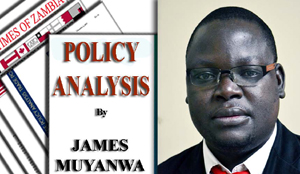 WHAT an eventful week the foregoing one was!
WHAT an eventful week the foregoing one was!
YES the week ended November 27, 2015, was an action-packed one with some unprecedented development in form of the first-ever Presidential Press Conference since the Patriotic Front (PF) government administration was ushered in.
Before that, the other week I attended a Media Training on Tax and Illicit Financial Flows(IFFs) organised by Action Aid Zambia (AAZ) at Southern Sun Hotel in Lusaka.
During the training a lot of issues came up which I hope in the future could form elements of an exclusive article on IFFs.
It is during the same week that President Lungu commissioned works for the construction of the US$2 billion 750 Megawatts Kafue Gorge Lower Hydropower station in Chikankata District.
On the same day the Zambia Co-operative Federation (ZCF) was expecting to receive the second batch of 150 out of the 2,000 milling machines under the Presidential Milling Initiatives was expected to arrive in Zambia.
Now it is common knowledge that by the time of the historic Press Conference, on November 26, 2015, the Zambian economy was going through turbulence.
This followed the hard bashing of the Kwacha by the international convertible currencies especially the s United States (US) dollar.
The record-fall in the value of the Kwacha which at its lowest ebb crossed the K14-per-dollar mark, triggered a rise in the prices of goods and services, most of them unnecessarily so because they are not, whatsoever, affected by the foreign exchange rate.
Yes apart from the drop in the prices of copper on the international market and the diminishing local manufacturing base, the Zambian Kwacha was also affected by the widening trade deficit as the result of the declining value of exports against the rising value of import into the country.
This conundrum was compounded by continued negative sentiments by some politicians, self-styled economic experts and some other stakeholders on the economic outlook.
Some entities added another dimension to the challenge with their speculative tendencies cashing in on the falling local currency.
A friend of mine told me that one individual had made K300,000 worth of deposits into his foreign currency account before the peak of the challenge, when a dollar was going at about K7.
By the time the Kwacha fell to its lowest position he had instantly nearly doubled the value of his money.
During the Press Conference President Edgar Lungu cited seven factors which could account for this falling in the value of the Kwacha.
Out of the seven, I want to focus on only one of them which I have already eluded to – the adverse sentiments about the general performance of the economy.
From a layman’s point of view I can liken the economy, especially a poorly performing one, to a patient on what some people may term deathbed.
At that point, whatever other people say about that person, obviously, becomes very important.
The words can either revive the patient or send him/her to his/her early grave.
Some Christians describe that as the power of the tongue and it seemingly works in both spiritual and physical realms.
For the economy, it is not different because apart from the law of supply and demand the sentiments can influence the commodity prices,
for instance, depending on the direction of the sentiments.
One online resource defines market sentiment as the general feeling about the climate as expressed by the direction of market prices.
Obviously the sentiments are influence by various factors and forces. A good example of that are the effects the rapid fall in the value of the Kwacha had on the prices of local products.
Once more why were prices in Lusaka affected more by the Kwacha’s fall than in any other town in the country?
In my view it was because of the strong sentiments and the quick spread of the news about the happening as the result of massive use of social media and other information and communication technology (ICT) channels.
In short, the high inflation rate which has now almost reached 20 per cent could be attributable to sentiments in the market, driven mainly through social media by people with various motives, some of them ulterior.
If the effects of the poor performance of the economy in the last two months or so were fueled by adverse sentiments and speculations, how could that factor be resolved? The answer to that is in positive sentiments!
This is all President Lungu did during the Press Conference and the results are there for all to see!
By coming up with an economic blueprint and specific measures the Government had embarked or intended to embark on to remedy the situation, he influenced the market sentiments and transformed them from negative to positive.
Hence the prevailing positive results!
In the short-term, the challenge is to sustain the positive sentiments and leaders should, therefore, continue talking positively about the economy, albeit that does not mean exaggerating or indeed giving false hopes because that can backfire.
In the long-term, there is no substitution for the need to increase exports while checking the imports.
For comments call: 0955 431442, 0977 246099, 0964 742506 or e-mail: jmuyanwa@gmail.com.






